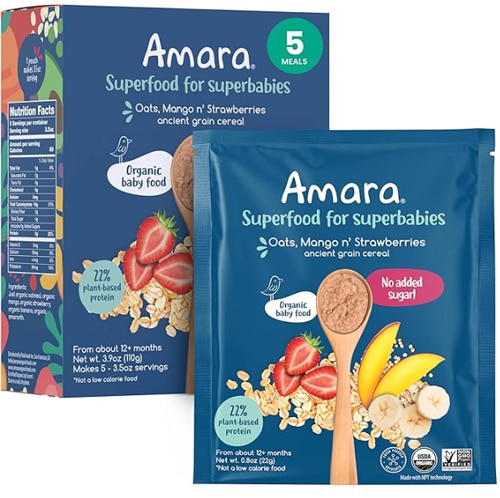Of all the milestones in your baby’s first year, introducing solid foods may be the most exciting. While eating probably seems like a no-brainer task for you, there is a lot involved when it comes to your baby. This post will help you understand the when, how, and what of starting your baby on solids.

When to start baby on solids
The timing of introducing solid foods can vary, but the
American Academy of Pediatrics recommends waiting until your child is about 6 months old.
Starting solids both too soon or too late can have potential downsides. It is important to make sure your baby is developmentally ready for solid foods by paying attention to signs of readiness.
Some signs of readiness to look for include:
- Good head control, without bobbing or needing support
- Being able to sit upright with little or no support
- Ability to reach for and grasp objects
- Absence of tongue thrust, meaning baby doesn’t automatically try to spit things out that are put in his or her mouth
- Showing interest in foods, such as opening mouth when food is near
If most or all of these signs are present in your child, it may be time to start solids. Other skills, such as consuming different textures and being able to grab and bring utensils to their mouth are things they will learn and develop with practice, and aren’t required to be in place beforehand.
How to start baby on solids
There are many methods for solid food introduction. Some parents begin with rice cereal mixed with a little bit of breastmilk or formula, while others start with commercially prepared or homemade pureed baby foods. A third and emerging practice is that of “
baby led weaning”, which bypasses the use of pureed foods and starts baby on age-appropriate pieces of soft, solid foods that they feed themselves. Which method you choose to follow is up to you, and each has its own set of pros and cons.
Regardless of which feeding method you choose, here are some tips to keep in mind when feeding solids to your baby:
1. Have the right setup.
Your baby should be securely sitting in a highchair with
a bib on (expect a mess!). You or another adult should be supervising him or her at all times. Use soft, plastic or silicone utensils and placemats as needed.
2. Begin slowly.
The first month or two of solid food introduction is mostly an experiment, and your baby is unlikely to be actually consuming much at this stage. Start by offering food just one time per day for the first few weeks to get your baby used to this new practice. By 7-8 months old, you can increase to feeding your baby 2-3 times per day. By their first birthday, they should be eating 3 meals per day with possible snacks in between.
3. Be patient.
Give your baby enough time to look at, feel, and taste the food. They are learning important new skills with eating, so avoid rushing them. Put only a few pieces of food on their tray at once or plan for a few spoonfuls of purees at a time to prevent overwhelming them.
4. Keep portion sizes small and textures appropriate.
Your baby’s mouth and stomach are still very tiny, and they likely have little to no teeth at this stage. Be sure to provide small enough pieces for your child to be able to safely grab and swallow without much effort. Make sure that the food is cooked thoroughly and is soft enough to prevent choking. As your baby gets older, they will be able to gradually eat larger, finger-sized foods.
5. Offer a wide variety.
Offer your baby foods from all food groups, and don’t limit them to just foods you like. Providing frequent exposure to a variety of foods can help develop your baby’s taste preferences and develop them into healthy and less picky eaters.
6. Be prepared for rejections.
Your baby will be trying many new flavors and textures of foods, which is a lot to take in! It is
normal for babies to reject or spit out food several times in the beginning. This doesn’t necessarily mean they don’t like it, they just might need more exposure to it. So keep trying!
7. Experiment with different timing of feeds.
It may be best to begin feeding baby solids when they are likely to be at least a little bit hungry, such as between nursing or formula feedings. However, you can experiment with different times of the day based on what works for yours and your baby’s schedules. Soon they will get used to eating solids on a schedule, even if it's a loose one.
8. Don’t worry if they aren’t eating much.
Breastmilk or
formula should still provide the majority of their nutritional intake until at least their first birthday, so it's okay if they aren’t getting much nutrition from solid foods in the beginning. Aim for a couple of tablespoons worth at each meal. As they get older and more experienced, the amount they eat will gradually increase.
What solids should you feed your baby?
The foods you decide to feed your child from day one matter a lot. The nutrition babies receive during this crucial stage plays an important role in things like
brain development, behavior and bone strength.
While there’s no strict list of foods to follow, there are some foods you should focus on. Some essential nutrients for your baby during this stage include
vitamin D, omega-3 fats, protein, and iron.
Good food choices include*:
- Soft or well-cooked fruits and vegetables without skins, such as ripe pears, carrots, sweet potatoes, squash, banana, and kiwi.
- Protein foods, like ground turkey, fish, scrambled eggs, tofu, pieces of chicken breasts, and thin strips of steak or pork loin.
- Whole grains like whole wheat bread without crust, soft whole grain crackers, oatmeal, and organic brown rice cereal or other whole grain cereals.
- Cooked legumes like lentils and beans.
- Full fat dairy like cheese and plain greek yogurt. Fat is essential for baby’s brain development, so be sure not to buy the skim variety. Keep in mind that cows milk should not be introduced until at least one year of age.
- Healthy fats, like olive and avocado oils and runny nut butters (which should be mixed into something soft and smooth rather than eaten alone)
*Note that these choices include the
most common allergenic foods. Contrary to old advice, it is now strongly recommended to introduce high allergen foods early on, which can actually
help prevent food allergies in your baby.
On the contrary, there are some foods that are not appropriate for your baby. These include:
- Honey, which should be avoided until at least age one, though all sources of added sugars should not be offered before age 2, according to the new 2020 Dietary Guidelines Advisory Committee.
- Cows milk, which can be introduced after age one.
- Choking hazards, such as nuts, whole grapes, hard vegetables and fruits, hard candies, popcorn, dried fruit, and meat or fish with bones.
In Summary
There are many things to keep in mind when it comes to feeding your baby solids, but ultimately, the goal should be to have fun with it. Before you know it your baby will be an advanced eater, so enjoy the process!





